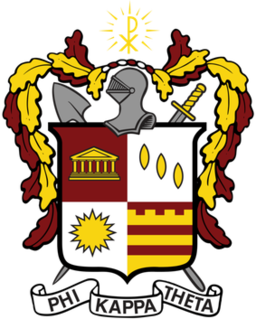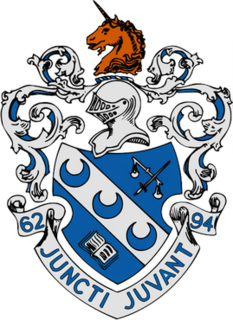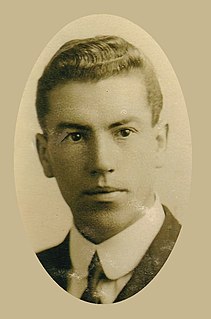
The Phi Beta Kappa Society (ΦΒΚ) is the oldest academic honor society in the United States, and is often described as its most prestigious one, owing to its long history and academic selectivity. Phi Beta Kappa aims to promote and advocate excellence in the liberal arts and sciences, and to induct the most outstanding students of arts and sciences at American colleges and universities. It was founded at the College of William and Mary on December 5, 1776 as the first collegiate Greek-letter fraternity and was among the earliest collegiate fraternal societies.

Rensselaer Polytechnic Institute (RPI) is a private research university in Troy, New York, with additional campuses in Hartford and Groton, Connecticut. It was established in 1824 by Stephen van Rensselaer and Amos Eaton for the "application of science to the common purposes of life" and is the oldest technological university in the English-speaking world. Numerous American colleges or departments of applied sciences were modeled after Rensselaer.

Phi Iota Alpha (ΦΙΑ), established on December 26, 1931, is the oldest Latino Fraternity in existence, and works to motivate people, develop leaders, and create innovative ways to unite the Latino community. The organization has roots that stem back to the late 19th century to the first Latin American fraternity, and the first Latin American student organization in the United States. The brotherhood is composed of undergraduate, graduate, and professional men committed towards the empowerment of the Latin American community by providing intensive social and cultural programs and activities geared towards the appreciation, promotion and preservation of Latin American culture.

Phi Kappa Theta (ΦΚΘ), commonly known as Phi Kap, is a national social fraternity that has over 30 active chapters and colonies at universities across 21 U.S. states. The fraternity was founded on April 29, 1959 at Ohio State University in Columbus, Ohio with the agreed-upon merger of two older Catholic fraternities, Phi Kappa and Theta Kappa Phi. Phi Kappa was founded exactly 70 years prior in 1889 at Brown University in Providence, Rhode Island, while Theta Kappa Phi was founded later in October 1919 at Lehigh University in Bethlehem, Pennsylvania.

Theta Xi (ΘΞ) is a North American Greek-letter social college fraternity. It was founded at Rensselaer Polytechnic Institute (RPI) on April 29, 1864. Of all the social fraternities today, Theta Xi was the only one founded during the Civil War. Its Grand Lodge is headquartered in suburban St. Louis, Missouri. Since its inception, Theta Xi has grown to include more than 60,000 initiated members. Currently, there are approximately 50 active chapters, and 3 colonies. The Theta Xi Fraternity Chapter House at Rensselaer Polytechnic Institute is listed on the National Register of Historic Places.

Delta Tau Delta (ΔΤΔ), commonly known as Delt or DTD, is a United States-based international Greek letter college fraternity. Delta Tau Delta was founded in 1858 at Bethany College, Bethany, Virginia,. It currently has around 140 student chapters nationwide, as well as few regional alumni groups. Its national philanthropic partner is the diabetes research organization JDRF.

Phi Beta Sigma Fraternity, Inc. (ΦΒΣ) is a historically African American Greek lettered fraternity. It was founded at Howard University in Washington, D.C. on January 9, 1914, by three young African-American male students with nine other Howard students as charter members. The fraternity's founders, Abram Langston Taylor, Leonard Frances Morse, and Charles Ignatius Brown, wanted to organize a Greek letter fraternity that would exemplify the ideals of Brotherhood, Scholarship and Service while taking an inclusive perspective to serve the community as opposed to having an exclusive purpose. The fraternity exceeded the prevailing models of Black Greek-Letter fraternal organizations by being the first to establish alumni chapters, youth mentoring clubs, a federal credit union, chapters in Africa and a collegiate chapter outside of the United States. It is the only fraternity to hold a constitutional bond with a historically African-American sorority, Zeta Phi Beta (ΖΦΒ), which was founded on January 16, 1920 at Howard University in Washington, D.C., through the efforts of members of Phi Beta Sigma.

Phi Sigma Alpha, commonly known as La Sigma, is a Puerto Rican fraternity originally established as the Sigma Delta Alpha Fraternity on October 22, 1928, at the University of Puerto Rico by 12 students and a professor. Phi Sigma Alpha can trace its roots back to 1898 to the Union Hispano Americana, as well as to the first ever Greek letter Hispanic-oriented fraternity, Sigma Iota, established in 1912. By 1998 there were over 4,376 members.

Sigma Iota (ΣΙ), Established March 12, 1912 is the first Latin American–based Greek lettered inter-collegiate fraternity in the United States. On December 26, 1931 Sigma Iota Fraternity merged with Phi Lambda Alpha Fraternity to form Phi Iota Alpha.

Phi Lambda Alpha (ΦΛΑ), established 1919 at the University of California, Berkeley was the first Latin American–based Greek Lettered collegiate fraternity in the Western United States.
The North American fraternity and sorority system began with students who wanted to meet secretly, usually for discussions and debates not thought appropriate by the faculty of their schools. Today they are used as social, professional, and honorary groups that promote varied combinations of community service, leadership, and academic achievement.
The history of Rensselaer Polytechnic Institute (RPI) spans nearly two hundred years beginning with its founding in 1824. RPI is the oldest continuously operating technological university in both the English-speaking world and the Americas. The Institute was the first to grant a civil engineering degree in the United States, in 1835. More recently, RPI also offered the first environmental engineering degree in the United States in 1961, and possibly the first ever undergraduate degree in video game design, in 2007.

Henry Bradford Nason was a United States chemist.
Fraternities and sororities, or Greek letter organizations (GLOs), also collectively referred to as "Greek life", are social organizations at colleges and universities. A form of the social fraternity, they are prominent in the United States and Canada. Similar organizations exist in other countries as well, including the Studentenverbindungen of German-speaking countries or the Goliardia in Italy.

Alpha Zeta (ΑΖ) Fraternity is the first-known fraternity in the United States founded by international Latin American students. Alpha Zeta was founded at Cornell University on January 1, 1890. In the fall of 1889, international Latin American students decided to form a fraternity that would cater to their needs. Since travelling was more of a challenge in 1889–1890, during the winter break, the organization's founders stayed in Ithaca, New York. On New Year's Day in 1890, at a meeting on campus, the founders formed the first Latin American student fraternity in the United States. The organization had students from the Caribbean, Central and South America. The first members came from Nicaragua, Honduras, Puerto Rico, Brazil, and Argentina. Alpha Zeta led a movement of international Latin American fraternities that existed in the early part oft the 20th century before becoming defunct. Psi Alpha Kappa, founded at Lehigh University in the fall of 1900, was the first inter-collegiate Latin American fraternity to be established in the United States. This movement of fraternities that catered to international Latin American students included Phi Chi Delta, Sigma Iota, Phi Lambda Alpha, Lambda Sigma Alpha Fraternity, Phi Beta Mex, Alpha Lambda Mu, Phi Iota Alpha, and many others. These organizations all disappeared from college campuses by the mid-1900s.
Psi Alpha Kappa (ΨΑΚ) was a fraternity started by international Latin American students at Lehigh University in the fall of 1900. It has the distinction of being the first inter-collegiate Latin American fraternity in the United States. At the turn of the last century, international Latin American students began traveling to the United States for an education in larger numbers. English began replacing French as the second language to learn in Latin America so instead of traveling to Europe for an education, wealthy Latin American families began to send their sons to the United States. As a result, Latin American students began to establish student organizations that would cater to their needs.
The Latino Greek Movement seen on college campuses in the United States was at the Rensselaer Polytechnic Institute (RPI), in Troy, New York in 1898 when a group of Latin American students organized the Union Hispano Americana (UHA) as a cultural and intellectual secret society based on the ideology of Pan-Americanism. In New Jersey on December 1, 1975, Lambda Theta Phi Latin Fraternity, Inc. was founded at Kean University in Union New Jersey. With its birth, Lambda Theta Phi became the one of many organization to serve the Latino community in the United States. With the organizations second chapter at Rutgers University-New Brunswick in the fall of 1978, Lambda Theta Phi was well on its way to growing the Latino Greek movement. A Latina sorority was established soon after Lambda Theta Phi at Kean University as well. Lambda Theta Alpha Latin Sorority, Inc. became the first Latina Greek-lettered organization in the country. Both of these Greek-lettered organizations saw the Latino Greek Movement's infancy days. The movement was created in the state of New Jersey with the establishment of other organizations.

Archibald Wilmotte Leslie Bray (1883–1942) was an English-American educator. Bray served as a founder and head of Department of Biology at Rensselaer Polytechnic Institute (RPI), between 1925 and his death in 1942. Bray is credited by Nobel laureate Harold Ulrey as being an inspiration for him in switching from psychology to the natural sciences. A popular teacher at several universities including University of Montana, Harvard and Rensselaer, a prominent freshman dormitory at RPI is named in his honor.













